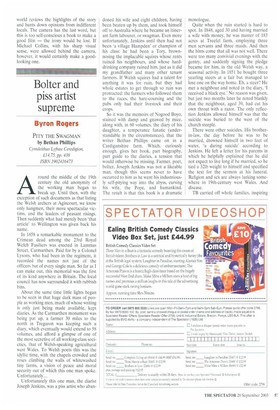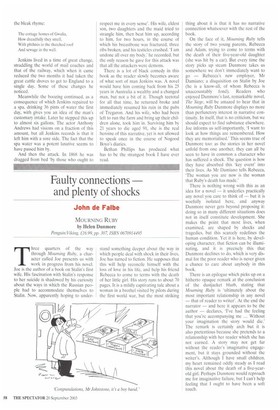Bolter and piss artist supreme
Byron Rogers
PITY THE SWAGMAN by Bethan Phillips Cymdeithas Lyfrau Ceredigion, .114.75, pp. 438 ISBN 1902416473 Around the middle of the 19th century the old anonymity of the working man began to break up. Until then, with the exception of such documents as that listing the Welsh archers at Agincourt, we know only hangmen, their more spectacular victims, and the leaders of peasant risings. Then suddenly what had merely been 'that article' to Wellington was given back his name.
In 1858 a remarkable monument to the Crimean dead among the 23rd Royal Welch Fusiliers was erected in Lammas Street, Carmarthen. Paid for by a Colonel Lysons, who had been in the regiment, it recorded the names not just of the officers but of every single man. So far as I can make out, this memorial was the first of its kind anywhere in Britain. The local council has now surrounded it with rubbish bins.
About the same time little lights began to be seen in that huge dark mass of people as working men, much of whose writing is only just being made available, kept diaries. As the Carmarthen monument was being put up, a farmer 30 miles to the north in Tregaron was keeping such a diary, which eventually would extend to 58 volumes, and afford a glimpse of one of the most secretive of all working-class societies, that of Welsh-speaking agricultural west Wales. To Welsh poets this was the idyllic time, with the chapels crowded and roses climbing the walls of whitewashed tiny farms, a vision of peace and moral security out of which this one man spoke. Unfortunately...
Unfortunately this one man, the diarist Joseph Jenkins, was a piss artist who aban
doned his wife and eight children, having been beaten up by them, and took himself off to Australia where he became an itinerant farm labourer, or swagman. Even more unfortunately, Jenkins until then had not been 'a village Hampden' or champion of his class: he had been a Tory, brownnosing the implacable squires whose rents ruined his neighbours, and whose harddrinking company ruined him, just as it did my grandfather and many other tenant farmers. If Welsh squires had a talent for anything it was for ruin, but they had whole estates to get through so ruin was protracted: the farmers who followed them to the races, the hare-coursing and the pubs only had their livestock and their crops.
So it was the memoirs of Nogood Boyo, stained with damp and gnawed by mice, along with, in 60 volumes, the diary of his daughter, a temperance fanatic (understandable in the circumstances), that the writer Bethan Phillips came on in a Cardiganshire farm. Which, curiously enough, gives her book, part biography, part guide to the diaries, a tension that would otherwise be missing. Farmer, poet, bolter, Joseph Jenkins was not a likeable man, though this seems never to have occurred to him as he went his industriously self-pitying way into the abyss, cursing his wife, the Pope, and humankind. The result is that this book is a dramatic monologue.
Quite when the ruin started is hard to spot. In 1848, aged 30 and having married a wife with money, he was master of 183 acres at Treefel farm, employing three men servants and three maids. And then the hints come that all was not well. There were too many convivial evenings with the gentry, and suddenly signing the pledge became for him, in the old Welsh way, a seasonal activity. In 1851 he bought three yearling steers at a fair but managed to lose one on the way home. Eh, a steer? He met a neighbour and noted in the diary, 'I received a black eye.' No reason was given, but just two months later he noted blankly that the neighbour, aged 39, had cut his own throat with a razor. The only reflection Jenkins allowed himself was that the suicide was buried to the west of the church steeple.
There were other suicides. His brotherin-law, the day before he was to be married, drowned himself in two feet of water, 'a daring suicide' according to Jenkins, He left a letter for his parents in which he helpfully explained that he did not expect to live long if he married, so he tied a 321b weight to himself and specified the text for the sermon at his funeral. Religion and sex are always lurking somewhere in 19th-century west Wales. And disease.
TB carried off whole families. inspiring the bleak rhyme:
The cottage homes of Gwalia, How dreadfully they smell, With phthisis in the thatched roof And sewage in the well.
Jenkins lived in a time of great change, straddling the world of mail coaches and that of the railway, which when it came reduced the two months it had taken the great cattle droves to get to England to a single day. Some of these changes he noticed.
Meanwhile the boozing continued, as a consequence of which Jenkins repaired to a spa, drinking 36 pints of water the first day, with gives you an idea of the man's customary intake. Later he stepped this up to almost six gallons. The actor Anthony Andrews had visions on a fraction of this amount, but all Jenkins records is that it left him with a sore side. The fact that the spa water was a potent laxative seems to have passed him by.
And then the attack. In 1868 he was dragged from bed 'by those who ought to respect me in every sense'. His wife, eldest son, two daughters and the maid tried to strangle him, then beat him up, according to him, for two hours, in the course of which his breastbone was fractured, three ribs broken, and his testicles crushed. am undone all over my body,' he recorded, but the only reason he gave for this attack was that all the attackers were demons.
There is a lot of black comedy in this book as the reader slowly becomes aware of what sort of man Jenkins was. A novel would have him coming back from his 25 years in Australia a wealthy and a changed man, but not a bit of it. Though teetotal for all that time, he returned broke and immediately resumed his ruin in the pubs of Tregaron. And his wife, who had been left to run the farm and bring up their children alone, took him in. Surviving him by 21 years to die aged 91, she is the real heroine of this narrative, yet is not allowed to speak once in the course of Nogood Boyo's diaries.
Bethan Phillips has produced what has to be the strangest book I have ever read.



















































































 Previous page
Previous page